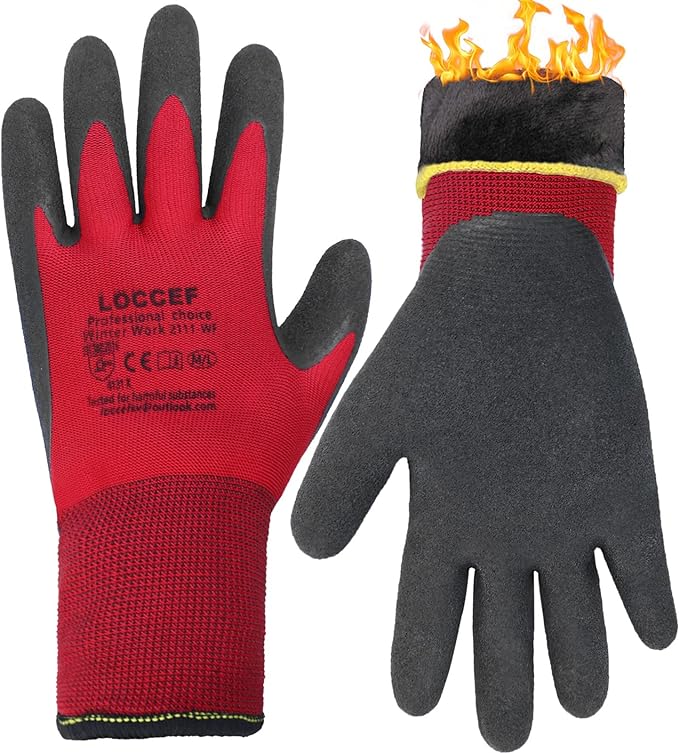Insulated work gloves are an essential tool for individuals working in industries such as construction, manufacturing, and outdoor occupations. These specialized gloves provide protection, comfort, and insulation against various hazards and extreme weather conditions. In this article, we will explore the benefits and features of insulated work gloves, their applications across different industries, and how they contribute to hand safety and productivity. Join us as we delve into the world of insulated work gloves and discover how they protect hands in challenging environments.

I. Understanding the Importance of Hand Protection
1.1 The Vulnerability of Hands:
Hands are one of the most exposed and vulnerable parts of the body in work environments. They are at risk of injuries from impacts, cuts, abrasions, chemicals, extreme temperatures, and other potential hazards. Proper hand protection, such as insulated work gloves, is crucial for minimizing these risks and safeguarding hand health.
1.2 Impact on Work Performance:
In addition to physical safety, hand protection also significantly impacts work performance. When workers feel secure and comfortable wearing insulated work gloves, they can focus on their tasks without worrying about hand injuries or discomfort. Well-protected hands translate to increased productivity, reduced downtime, and improved overall job satisfaction.

II. Benefits of Insulated Work Gloves
2.1 Thermal Insulation:
Insulated work gloves are designed to provide thermal insulation, protecting hands in extreme cold or hot temperatures. They effectively regulate hand temperature, keeping hands warm in cold environments and preventing excessive heat absorption in hot conditions. This insulation is crucial for workers who frequently work outdoors or in cold storage facilities, ensuring hand dexterity and preventing discomfort or frostbite.
2.2 Enhanced Grip and Dexterity:
Insulated work gloves feature innovative materials and designs that allow for an enhanced grip and dexterity. Despite their insulation properties, these gloves maintain flexibility, allowing workers to handle tools and perform intricate tasks with ease. The enhanced grip reduces the risk of accidental slips and drops, ensuring safety and efficiency in various work environments.

III. Applications in Different Industries
3.1 Construction and Manufacturing:
In the construction and manufacturing industries, insulated work gloves are essential for protecting hands from impact, cuts, abrasions, and cold conditions. Workers in these sectors often handle heavy machinery, tools, and sharp materials, making hand protection a top priority. Insulated work gloves provide the necessary insulation and durability to withstand challenging environments encountered on construction sites and in manufacturing facilities.
3.2 Utilities and Electrical Work:
Insulated work gloves play a crucial role in utilities, electrical, and maintenance work, where workers encounter electrical hazards and the risk of arc flash incidents. These gloves are designed to provide electrical insulation, protecting workers from electrical shock and burns. Insulated work gloves with specialized features, such as high voltage-resistant materials and compliance with safety standards, are essential in industries where contact with live electrical equipment is common.

IV. Features for Optimal Hand Safety
4.1 Cut and Puncture Resistance:
Insulated work gloves often incorporate cut and puncture-resistant materials, such as Kevlar and reinforced synthetic fibers. This feature ensures protection against sharp objects, jagged edges, and potential puncture hazards encountered in various work environments. It significantly reduces the risk of cuts and punctures, preserving hand integrity and minimizing injuries.
4.2 Chemical and Liquid Resistance:
Certain industries require insulated work gloves that offer protection against chemicals and liquids. These gloves are typically constructed with specialized coatings or barrier materials that repel hazardous substances, providing a protective barrier between the worker’s hands and the chemicals. Chemical-resistant insulated work gloves offer peace of mind and prevent skin contact with harmful substances, reducing the risk of chemical burns or irritations.
V. Choosing the Right Insulated Work Gloves
5.1 Assessing Hazards and Risks:
Selecting the appropriate insulated work gloves requires a comprehensive understanding of the specific hazards and risks present in the work environment. Conducting a thorough hazard assessment helps identify the necessary safety features required, such as impact resistance, thermal insulation, cut resistance, chemical resistance, or high voltage protection.
5.2 Proper Sizing and Fit:
Proper sizing and fit are essential for optimal hand protection and comfort. Ill-fitting gloves may hamper hand dexterity, cause discomfort, or even increase the risk of accidents. Workers should ensure that insulated work gloves are available in different sizes and take the time to find the most suitable fit for their hand measurements. Gloves with adjustable features, such as adjustable cuffs or Velcro straps, provide a more secure and personalized fit.

VI. Maintaining and Extending Glove Lifespan
6.1 Proper Care and Maintenance:
In addition to proper care and maintenance, workers should also consider the following practices to ensure the longevity and effectiveness of their insulated work gloves. By incorporating these tasks into their routine, they can maximize hand protection and maintain optimal insulation in challenging work environments.
Firstly, it is essential to establish a cleaning schedule for insulated work gloves. Depending on the nature of the work and the level of dirt or debris accumulated, gloves may require regular cleaning. Workers should follow the manufacturer’s recommendations for cleaning methods and materials. Proper cleaning ensures that the gloves remain free of contaminants that could compromise their performance and insulation.
6.2 Investment in Quality:
Investing in high-quality insulated work gloves is an investment in hand safety and productivity. Working with reputable brands and suppliers that prioritize quality and compliance with safety standards ensures the reliability and durability of the gloves. Although high-quality gloves may have a higher initial cost, their performance and lifespan outweigh the expense, leading to long-term cost savings and uninterrupted hand protection.
Insulated work gloves are essential tools for protecting hands in challenging work environments. From thermal insulation to enhanced grip and dexterity, these gloves provide invaluable safety and comfort benefits. Whether in construction, utilities, or electrical work, insulated work gloves play a vital role in ensuring hand safety, reducing the risk of injuries, and enhancing productivity. The key to obtaining optimal hand protection lies in understanding the specific hazards, selecting gloves with suitable safety features, and maintaining the gloves for their lifespan. By prioritizing hand safety with insulated work gloves, workers can focus on their tasks with confidence, knowing that their hands are well-protected in demanding work conditions.


